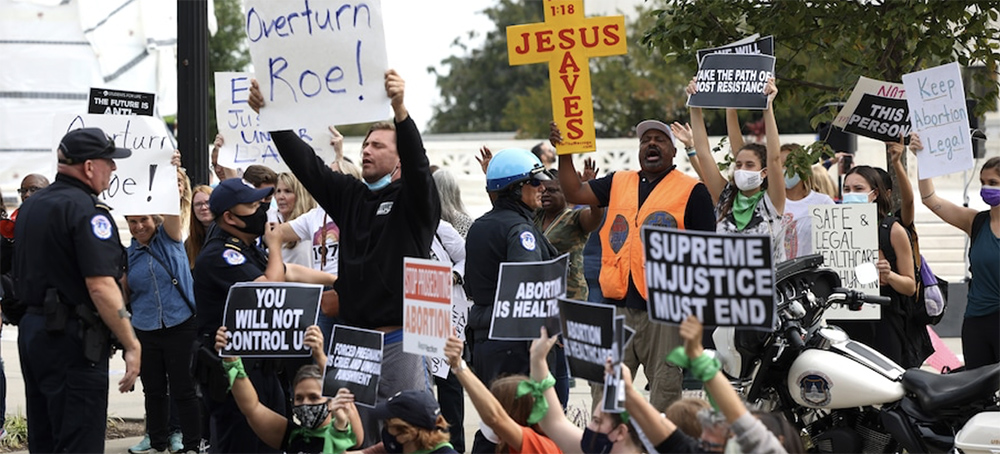
Abortion rights and antiabortion activists protest outside the Supreme Court on Oct. 4 in D.C. (photo: Kevin Dietsch/Getty Images)
01 December 21
Roe v. Wade is an important piece of the duct tape that holds this fractious nation together, and it would be a grievous error for the antiabortion majority on the Supreme Court to rip it away.
But that is precisely what the court, with its 6-3 conservative majority, looks poised to do. Wednesday’s oral arguments over Mississippi’s law banning abortion after 15 weeks of pregnancy will not really be about “textualist” or “originalist” legal principles. They will be about whether the Constitution protects a woman’s freedom over her own body — a liberty recognized when Roe was decided on Jan. 22, 1973.
I remember that day well, because it was also the day when former president Lyndon B. Johnson died. I was one of the editors of the Michigan Daily, the student newspaper at the University of Michigan, and we had a passionate argument that went late into the evening over which should be our lead story. Should it be legalized abortion across the nation? Or the man who sent tens of thousands of young Americans to die in the Vietnam War?
Most of the female editors saw the historic importance of Roe and understood the impact it would have on women’s lives. Most of the male editors — myself included, I confess — could not see past Vietnam and pushed hard for LBJ. We won, sort of: The paper ended up stripping Johnson’s death across the top of the front page and putting the Roe decision right beneath it, still above the fold, with a boldface two-line headline. For history’s sake, I thought that was the right call.
I was spectacularly wrong. Johnson was indeed a towering figure, but he’d been long out of office and had to die at some point anyway. Roe was like a bolt from the blue, and with it the nation took a giant stride toward treating women as full and equal citizens under the law. The decision’s impact continues to this day — but perhaps not for many days longer.
There are those who claim that Roe is divisive, that the ruling set the stage for years of bitter conflict by recognizing a constitutional right to abortion that cannot be unduly infringed by the states. But I believe that analysis is wrong. What’s truly divisive is abortion itself — an issue on which, for many Americans, there simply is no middle ground.
Some people believe that all abortion is murder and that every pregnancy should be brought to full term. I do not share this view. But for those who do, how could there ever be compromise? What does it matter whether an abortion takes place in the first, second or third trimester, or whether it takes place before or after the point at which the fetus would be viable outside the womb? What is the difference between taking a Plan B pill and having a surgical abortion after 15 weeks? If both are “murders,” how can one be acceptable and one not?
Like most Americans, I do not believe that all abortion is murder. It doesn’t matter whether I think a line should be drawn at viability or how I believe the health and well-being of the pregnant person should be factored in. What matters is that my view, whatever its nuances, can never be acceptable to those who take an absolutist position against abortion.
This is why I see Roe as unifying rather than divisive: It makes a yes-no decision. It sets a baseline that some of us cannot abide but that most of us applaud or can live with. It says that, yes, the Constitution, in its words and its penumbra, does protect a woman’s fundamental right to terminate her pregnancy.
Like all of our constitutionally protected freedoms, the right to
choose can be restricted, but not taken away. That has been the status
quo for nearly five decades, and the nation has muddled through. But if Roe
is reversed — if the court rules, as its most conservative justices
have argued, that no protected right to reproductive choice exists —
then the political cold war over abortion will flare immediately into a
roaring blaze.
If states such as Texas pass laws that effectively eliminate all abortions, those with the means will travel to other states to terminate their pregnancies. Many poor people will risk their health by seeking illegal abortions. Some doctors will most likely risk imprisonment. There will be intense pressure for pro-choice federal legislation, and abortion will be a hot-button issue in every congressional district.
As if our politics needed more heat.
Roe will never please everyone, but it has served the country well. I fear this Supreme Court is foolish enough to throw it away.




No comments:
Post a Comment